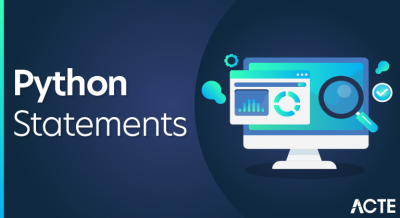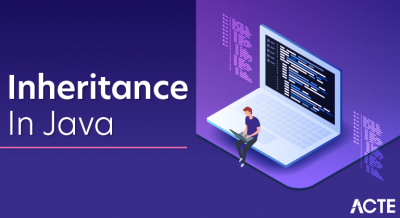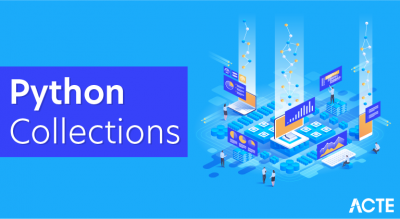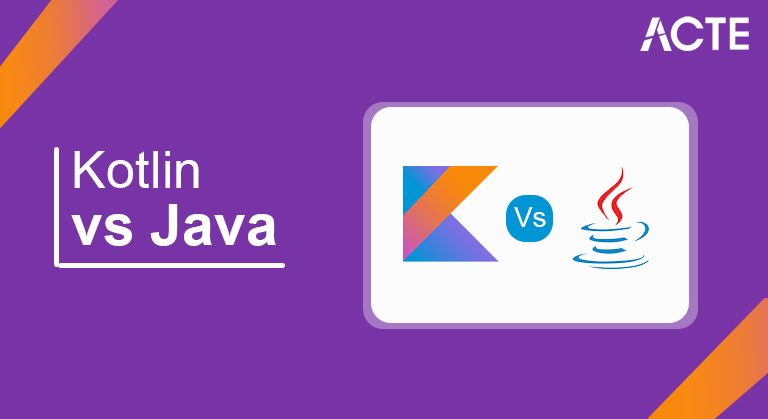
For most, Kotlin’s strengths outweigh the language’s setbacks. There are definite limitations within Java that impede Android API design. Kotlin is inherently lightweight, clean and far less verbose, especially in terms of writing callbacks, data classes, and getters/setters.
- Introduction to Java and its Benefits
- Challenges of java and its application
- Introduction to Kotlin and its Benefits
- Challenges of Kotlin and its applications
- How does Kotlin enhance Android app development compared to Java?
- Compare the community support and developer satisfaction levels for Kotlin and Java
- Discuss the Debugging and Testing Capabilities of Kotlin and Java
- What Are the Industry Trends and Adoption Rates of Kotlin and Java?
- Conclusion
- Listed below are the benefits of the Java language.
- Java is multiplatform and works on practically any device, server or operating system.
- Its coding is robust, and it is impossible for a Java instruction to corrupt memory or compromise data from other applications in OS X.
- Java is object-oriented and makes it easy to build modular applications and reuse parts that contribute to robustness.
- It’s ready to use, and with Java, you’ll have a lot of third-part code ready to use.
- Comparing Kotlin vs Java performance with other languages, Java is easier to use, compile and simplifies debugging and deployment.
- Java is an open-source language that ensures security as many of its libraries are managed by trusted companies like Google, Apache and others
Introduction to Java and its Benefits:
Java is the native language used by Android, applications that communicate with the operating system and directly access the hardware use Java. This language allows the creation of any program and supports almost all types of machines, and OS X whether it is Android, Windows, or Linux. Java was developed by Sun Microsystems (now a property of Oracle) and anyone can use microservices with Java.
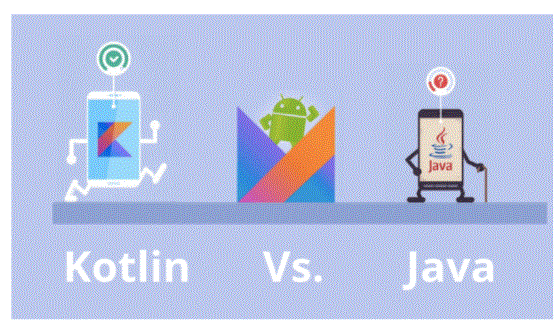
- Below are the challenges of Java.
- The syntax used by Java can be a bit complicated or cumbersome compared to other languages – such as C++ or Python.
- With Java, it is impossible to access some content that may be incompatible with the device or equipment being used.
- Accessing new Java enhancements in mobile development is not easy.
- Test-driven development for Java requires writing more code and carries a lot of risk of programming errors and bugs
- Java is slightly slower than other programming languages and takes up a lot of system memory
- Spotify
- cash app
- Signal
- Amaze file manager
Challenges of java and its application:
What are the challenges of the Java language?
What are the applications of Java?
- Kotlin application deployment is fast to compile, lightweight, and prevents applications from growing in size.
- Any piece of code written in Kotlin is much smaller than in Java, because it is less verbose and less code means fewer bugs.
- Kotlin compiles the code into a bytecode that can be executed in the JVM. Thus, all libraries and frameworks built in Java are transferred and run in a Kotlin project.
- Kotlin scripts help to configure projects in Android Studio to support automatic completion, and it helps to reduce compile-time error detection.
- It is protected from NullPointerException (The Billion Dollar Mistake).
- Kotlin incorporates coroutines, as well as interoperability with JavaScript, for web development.
Introduction to Kotlin and its Benefits:
What is Kotlin?
In Kotlin vs Java, Kotlin is the newly created language which is inspired by Java, but it is an improved version of it with many additional features. It is clean, relatively simple, and has fewer formalities and rules than Java and other programming languages. To use this language to program Android apps, developers still need to understand basic programming concepts and structures.
What are the benefits of Kotlin?
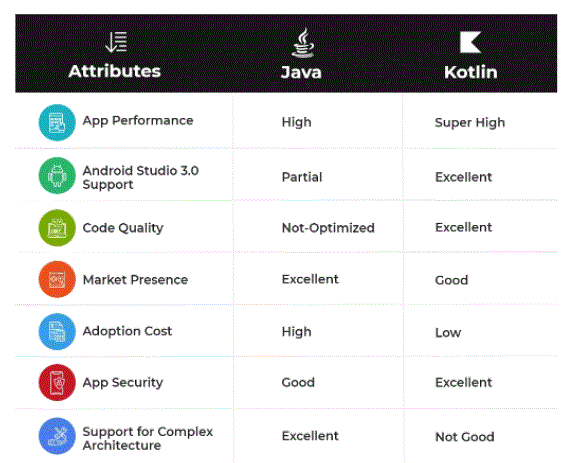
- Kotlin is not that popular, and therefore the developer community is sparse compared to other well established languages like Java.
- Kotlin matches loosely, and initial code readability becomes a bit difficult to read and understand at first.
- It has a small support community because Kotlin is smaller than Java. In addition, it has fewer libraries, blog posts, and tutorials.
- Kotlin has a steep learning curve, and converting teams to Kotlin can be a real challenge due to the language’s concise syntax.
- There are very few Kotlin developers available in the market. Therefore, it is quite difficult to find an experienced mentor.
- Trello
- Evernote
- Twidere for Twitter
- Shadowsocks
Challenges of Kotlin and its applications:
What are the challenges of Kotlin language
What are the applications of Kotlin?
- Provides Sorting Coding
- Kotlin uses the JVM, which combines the features of OOP and functional-oriented programming.
- Provides fast compilation
- Kotlin can support a wide variety of extension functions without any changes to the code
- You can write Kotlin code using the IDE or using the command-line interface
- Smart feature casting helps you cut application cost and improve its speed or performance.
- Write code once and run it on almost any computing platform
- It is designed for building object-oriented applications.
- It is a multithreaded language that allows automatic memory management.
- Facilitates distributed computing in its network-centric form.
Features of Kotlin and java:
Features of Java:
Here are the important features of Java:
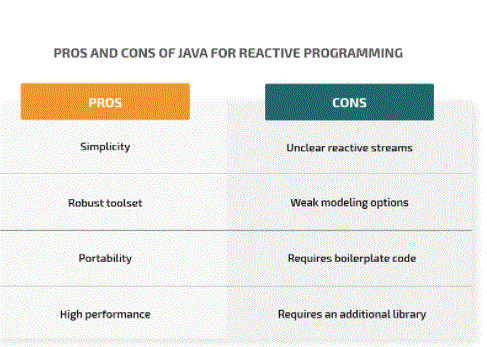
How does Kotlin enhance Android app development compared to Java?
Kotlin offers several enhancements for Android app development compared to Java. Here are some key ways in which Kotlin improves the Android development experience:
Concise and expressive syntax:
Kotlin’s syntax is more concise, reducing boilerplate code and making the codebase more readable and maintainable. With this, developers may work more efficiently, resulting in shorter iterations.
Null safety:
Kotlin addresses the null pointer exception problem with its built-in null safety features. It distinguishes between nullable and non-nullable types, reducing the likelihood of null-related crashes. This feature helps ensure app stability and improves overall robustness.
Extension functions:
By introducing extension methods, Kotlin makes it possible for programmers to extend the functionality of classes without altering the base code. This enables developers to write more expressive and intuitive code, extending the functionality of Android framework classes.
Coroutines for asynchronous programming:
Kotlin has first-class support for coroutines, which simplify handling asynchronous operations. This feature leads to cleaner and more maintainable code for handling network requests, and database operations.
Data classes:
Kotlin introduces data classes, which automatically generate implementations of common methods such as equals(), hashCode(), and toString(). This reduces boilerplate code when creating simple data containers or model classes, improving code readability and maintainability.
Interoperability with Java:
Kotlin’s complete compatibility with Java makes it simple for programmers to add to existing Java programs. This allows Android app developers to utilize Java libraries, frameworks, and tools without much hassle while migrating from Java to Kotlin.
Enhanced standard library:
Kotlin’s augmented standard library includes necessary tools and extensions for creating Android apps. Everything from working with strings to reading and writing files to managing collections is covered. The new standard library reduces the complexity and increases the efficiency of common development activities.
Improved readability and maintainability:
Kotlin code is more readable because to features like lambda expressions, smart casts, and type inference. With these tools, developers may write code that is both expressive and concise, making it easier to understand and maintain. Better readability facilitates faster debugging, easier collaboration, and lowers the likelihood of bugs.
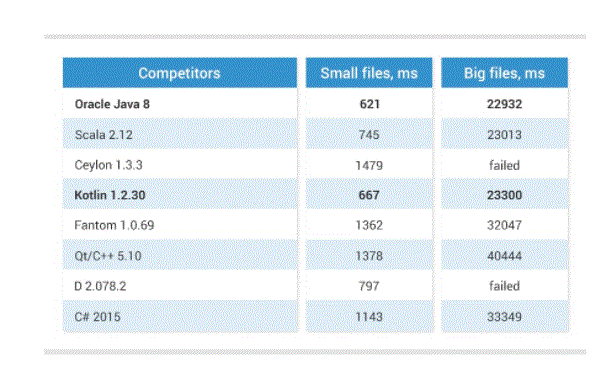
Compare the community support and developer satisfaction levels for Kotlin and Java
When evaluating programming languages such as Kotlin and Java, it is essential to consider community support and developer satisfaction. Here is a comparison of the levels of developer satisfaction and community support for both languages:
Java:
Community Support:
The Java programming language has a lengthy history and a large developer community. It has existed for decades and has a thriving ecosystem with abundant resources, forums, and online communities. The Java community provides significant resources including support, documentation, and libraries, making it simple to get answers to frequently encountered issues.
Developer Satisfaction:
Java is popular and is used in many different fields. High levels of satisfaction among developers are possible due to the widespread use and familiarity with the Java programming language. The language’s maturity, stability, and pervasive use frequently result in Java developers’ high levels of satisfaction.
Kotlin:
Community Support:
Kotlin’s community has grown rapidly ever since Google made it the official language for Android development. The number of people using Kotlin is growing rapidly. Helpful development communities, official forums, and Kotlin resources abound online. Kotlin also has a sizable community on code review and discussion hubs like Stack Overflow and GitHub.
Developer Satisfaction:
Kotlin has gained popularity among developers due to its modern syntax, improved productivity, and enhanced features compared to Java. The language’s focus on null safety, functional programming, and concise code has resonated well with developers. Kotlin’s rising adoption rates and positive feedback from developers indicate a generally high level of satisfaction among those who use the language.
Overall, both Java and Kotlin have supportive communities and satisfied developers. Java benefits from its long-standing presence, extensive resources, and widespread usage, while Kotlin’s community is growing rapidly, particularly in the Android development ecosystem.
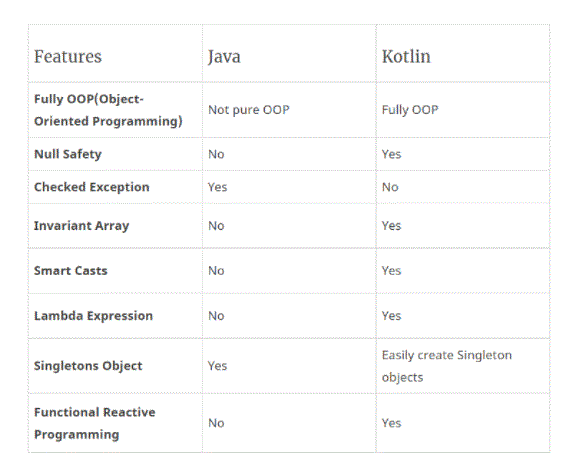
- Both Kotlin and Java provide strong debugging capabilities through their integration with popular IDEs like IntelliJ IDEA, Eclipse, and Android Studio.
- Developers can set breakpoints in the code, suspending program execution at specific points to inspect variables, step through the code line by line, and analyze the program’s state.
- The Debuggers in both languages offer variable inspection, allowing developers to view the current values of variables and expressions at runtime.
- They also assist in catching and diagnosing exceptions, providing insights into the cause of exceptions and allowing developers to inspect the call stack and trace the sequence of method invocations leading to the exception.
- Kotlin and Java offer robust testing capabilities, supporting widely-used testing frameworks like JUnit and Mockito. Both languages allow developers to write unit tests to verify the behavior and correctness of individual units of code.
- JUnit, a popular testing framework, is compatible with both Kotlin and Java, enabling developers to write and execute unit tests efficiently.
- Mockito, a popular mocking framework, works with both languages to construct fake objects or stub behaviors for component and dependency testing.
- Additionally, test runners in both Kotlin and Java provide a test execution environment, enabling developers to run and manage test suites effectively.
- Tools and plugins like JaCoCo can be utilized to measure code coverage, providing insights into the portions of code that are exercised by tests.
Discuss the Debugging and Testing Capabilities of Kotlin and Java
Software development would be impossible without debugging and testing. Here’s a discussion on the debugging and testing capabilities of Kotlin and Java:
Debugging:
Testing:
In summary, Kotlin and Java offer comparable debugging and testing capabilities. Both languages integrate well with popular IDEs, provide features like breakpoints, variable inspection, and exception handling for effective debugging.
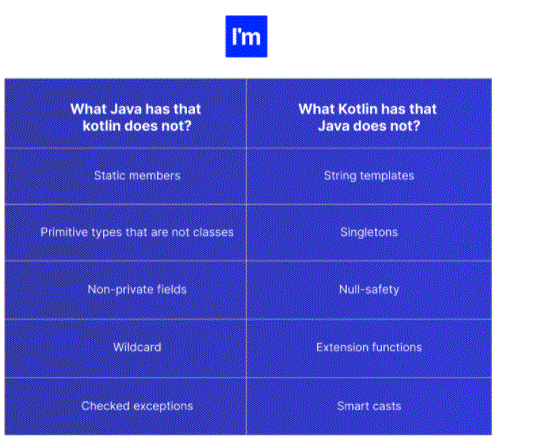
What Are the Industry Trends and Adoption Rates of Kotlin and Java?
Market trends and developer preference for Kotlin and Java are different. Here’s an overview of their current landscape:
Java:
Established Presence:
Java has been a dominant programming language in the industry for many years. It is widely adopted in various domains, including enterprise software, web development, Android app development, and more. Many large-scale systems and frameworks are built on Java.
Mature Ecosystem:
Java benefits from a mature ecosystem with extensive libraries, frameworks, and tools. It has a vast community of developers contributing to its growth and evolution. The language has a strong foundation and enjoys long-term support from Oracle.
Continued Usage:
Java continues to be widely used in enterprise applications, particularly for building robust and scalable systems. Its stability, performance, and compatibility make it a popular choice for companies, particularly those with legacy systems.
Enterprise Applications:
Java continues to be the preferred language for large-scale enterprise applications. Many established companies and organizations rely on Java for building mission-critical systems due to its stability, scalability, and extensive support. Java’s robustness and mature ecosystem make it a trusted choice for handling complex business requirements, integrating with legacy systems, and ensuring long-term support and maintenance.
Kotlin:
Rapid Growth:
Kotlin has experienced significant growth in recent years, especially after Google’s official endorsement of Kotlin is the language of choice for Android application development. Kotlin adoption has been on the rise since then, with many developers and organizations embracing it.
Android Development:
Kotlin’s adoption rate is particularly notable in the Android development space. It has become the preferred language for developing Android apps, with many new projects choosing Kotlin over Java. Kotlin offers enhanced features, improved productivity, and seamless interoperability with existing Java code.
General-Purpose Language:
Kotlin is not limited to Android development. It is increasingly being adopted for server-side development, web applications, and other domains. Kotlin’s concise syntax, null safety, and functional programming capabilities have attracted developers looking for modern and expressive language features.
Community and Tooling:
Kotlin has a growing and active community that contributes to its ecosystem. The language has gained strong support from JetBrains, the company behind Kotlin, resulting in excellent tooling support in popular IDEs like IntelliJ IDEA and Android Studio. This has further fueled its adoption and ease of use.
Kotlin’s general and Android-specific popularity is rising, whereas Java’s remains stable. Its modern syntax, null safety, interoperability, and developer productivity are among the reasons for its unexpected appeal.
Conclusion:
When considering all the disadvantages of Java, especially the problem with NullPointerExceptions, Kotlin seems to be the better of the two. However Java is still an essential language for the development of every Android app as the Android OS itself is based on it. If you want to future proof your Android app development services, you should hire Kotlin developers for the same.
